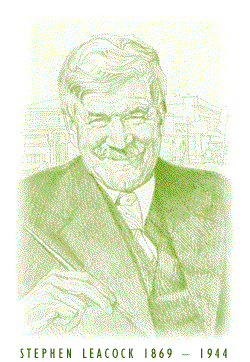
This is my last lecture. I have kept it purposely for you, my old pupils, who have had so many more from me in the last 35 years that one more cannot hurt you. The harm is already done, and you carry on all the familiar faces which I see about me that stamp which is set on all my students -- an irremovable look of resigned despair.
 The subject of our lecture tonight is Paradise Lost, not Milton's, but mine and yours, the Paradise Lost of all those whose college days are over. For the college, gently and firmly as life itself, tells us when our time is out. The subject of our lecture tonight is Paradise Lost, not Milton's, but mine and yours, the Paradise Lost of all those whose college days are over. For the college, gently and firmly as life itself, tells us when our time is out.
For most of you, just when you were at your happiest, the college made a thin pretence that you knew enough, gave you a degree and told you to go. For others (a few of the brighter faces I see here tonight) the college said that you couldn't get a degree in a hundred years and warned you to leave town. For us, your teachers, the time came when the college said it had heard our lectures so often that it would pay us not to give them any more.
But for all of us, however removed, the college that we have left sinks back into the soft colouring of retrospect better and kindlier than the garish light of daily life. In honouring me tonight with your presence, your generous gifts and your affectionate attention, it is not merely my own poor person that you honour but the memory and the meaning of the college in which I have had the honour to serve and the long years during which I have done so.
I have at least tried to do the best that was in me, and in doing it enjoyed a freedom of action, a liberty of thought and expression for which our college has ever been distinguished.
I admit that my lectures have not always been attended with success. My opening lecture in January 1901 on the monarchy of England was immediately followed by the news that the good old queen was taken ill. She did not survive long enough to hear my lecture on the president of the United States which might have saved her. I admit that my lectures on colonial freedom were followed by the Banana Riots in Trinidad; that the introduction of my Elements of Political Science into China drove the people into a frenzy of indignation and ended the Manchu Dynasty.
Yet, on the whole, I look back with pride over what I have done, and when I look at you tonight, I feel convinced that no other kind of teaching, no teaching at all, could have made you any different.
I can join with you, then, in turning this occasion rather to the honour of our Alma Mater than to my own. I can look back now and see things in their proper light. Very often the evening sun, breaking out below the clouds that have obscured the day, affords the best and widest view across the landscape, so with our retrospected college. We can see how little matter the small disputes, the petty quarrels of the day or hour, how much the long achievement of a century. The college lasts longer than we do; no single mind, no single life controls it. It represents for each of us, as it were, a part of ourselves, something greater than the worn body and the troubled mind that is our soul's companion of the day. I am convinced that there is for each of us a sort of super-self that comes out in emergency, in the effort of sacrifice, in the heroism of war, and in the creative ecstasy of the artist.
Nor is there any environment that better can develop it than a college. We can see it in the ideal professor -- careless and even comic in his dress, gullible to the edge of imbecility, an ear mark for the idler spirits of his clan, but carrying somewhere within him that higher idealism lifted above life that in the end endears him. And we see it in the graduate, looking back upon his Alma Mater, with a view detached from all meaner considerations of personal gain, from all the hard necessities of daily life, and seeing in it only that fleeting vision of the ideal of things as they might be that stands for us as a consolation for things that are.
May I say in conclusion that I appreciate more than I can tell you your gift of a set of my works to the college library and another set to my son. I am told you were in some doubt whether to let it be Shakespeare's works or my own. You have chosen wisely. I have not only written more than Shakespeare, but what I have written is worth more. Shakespeare's books can be had anywhere at 15 cents each, while mine run from a dollar up.
And with that, gentlemen, I will say, as I have these last 35 years and now for the last time, "That will be all for today."
For recollections of Leacock by former students and colleagues, see The McGill You Knew: An Anthology of Memories 1920-1960, (Longman Canada), edited by Edgar Andrew Collard.
|